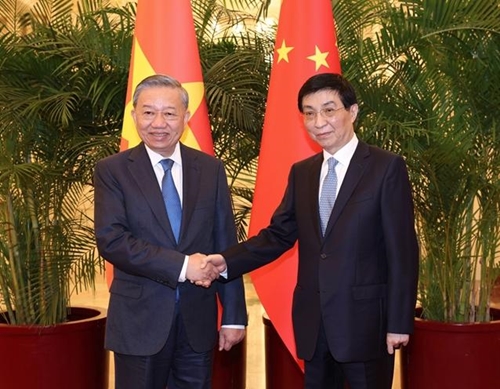Lam once again extended heartfelt gratitude to Wang for his role as the Special Representative of Party General Secretary and President Xi Jinping during the funeral for late Party General Secretary Nguyen Phu Trong. This gesture, he said, reflected the profound respect and regard of the Chinese Party, Government and people for the Vietnam-China relationship and the late Vietnamese leader.
    |
 |
|
Party General Secretary and President To Lam (L) meets with Wang Huning, member of the Standing Committee of the Politburo of the Communist Party of China Central Committee and Chairman of the Chinese People's Political Consultative Conference National Committee. |
He stressed that the Vietnamese Party and State attach special importance to consolidating and developing ties with the Chinese Party and State, considering it a strategic choice and a top priority in its foreign policy.
Vietnam remains steadfast in its "One China" policy, supports China's growth and the promotion of its important role to global and regional peace, cooperation and development, he said, adding that the Vietnamese Party, State and people always remember and value the significant and wholehearted support from their Chinese counterparts in the past struggle for national independence and reunification, as well as in the current national construction and development.
The Vietnamese Party and State leaders will continue inheriting and realizing the common perceptions reached by late Party General Secretary Nguyen Phu Trong and Party General Secretary and President Xi Jinping, he said.
Wang, for his part, noted that the visit, following Vietnam’s completion of the elections of key leadership positions, underscored the special importance that both countries place on their comprehensive strategic cooperative partnership and the Vietnam-China community with a shared future that carries strategic significance.
He affirmed China’s consistent view of its relationship with Vietnam as a priority in its neighborhood diplomacy. China always supports Vietnam to successful build socialism suited to its national conditions, maintain strategic self-reliance, and play an increasingly important role in the region and globally, he said.
In reply, Lam expressed a desire for the enhanced sharing of information, experience, theories and practices between the two parties through high-level visits and various exchange and cooperation mechanisms.
He suggested improving the effectiveness of cooperation mechanisms among key ministries and sectors such as public security, national defense, and foreign affairs; bolstering the friendly ties between the Vietnam Fatherland Front and the CPPCC, and encouraging sectors and localities to advance cooperation in the areas of mutual interest, such as increasing the import of Vietnamese agricultural products, developing rail connections, attracting Chinese large-scale and quality investment projects in Vietnam, and boosting tourism to the pre-COVID-19 levels.
The guest also hoped for increased multilateral coordination in the areas of shared interest and expanded people-to-people exchanges, particularly among the younger generation.
Agreeing with the top Vietnamese leader’s recommendations, Wang said China wishes and is willing to bolster exchanges between the two countries via all channels and at all levels, enhance substantive cooperation in all areas, and promote the coordinating role of the China-Vietnam Steering Committee for Bilateral Cooperation for their win-win collaboration.
He expressed his respect for the Vietnamese side’s suggestion on increasing the imports of Vietnamese goods, particularly farm produce, as well as expanding cooperation in new areas such as digital economy, green economy and IT, while promoting strategic connections under the “Belt and Road” and “Two corridors, One Belt” initiatives, bring practical benefits to the two countries’ people and enterprises.
He spoke highly of Vietnam’s review process, and practical and theoretical achievements after nearly 40 years of “Doi moi” (renewal), as well as its preparation for the 14th National Party Congress. Wang also briefed the Vietnamese leader on the important outcomes of the third plenary session of the 20th Central Committee of the Communist Party of China during the country’s key development period.
The host affirmed to join hands with the Vietnamese side to well implement the common perceptions reached by high-ranking leaders of the two countries, and suggested enhanced theoretical exchanges that contribute to the building of socialism in each nation.
Describing the people as the basis and source of strength of the Vietnam-China relations, he recommended both sides to carry out people-to-people exchanges, and cooperation projects in areas relating to people’s livelihoods.
Lam and Wang exchanged their viewpoints on the sea-related issues in a sincere and frank fashion, and laid stress on the significance to the maintenance of peace and stability in the region.
The Vietnamese leader suggested both sides control, and properly settle disagreements at sea, respect each other’s legitimate rights and interests, handle disputes and disagreements via peaceful means and in line with international law, including the United Nations Convention on the Law of the Sea (UNCLOS) 1982, and work together to develop the East Sea (South China Sea) into the waters of peace, friendship and cooperation.
Source: VNA